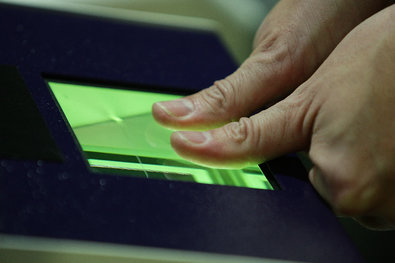
Biometrics and Banking
To better secure financial data, some of the biggest banks have begun substituting customer passwords with biometric scans of uniquely identifying traits, like fingerprints and facial contours. Reliance on these personal features, which are extremely hard to copy, takes the security onus off of customers, who may well use the same easy-to-guess password for all of their internet accounts. But is it really safe to trust banks with this kind of personal, and permanent, identifying data?
* secure = 안전하게 지키다[보호하다], 단단히 보안 장치를 하다/ substitute A with(for/by) B = 대신하다, 대치[교체]되다; 대용[교체/대치]하다/ biometric = 생물[생체] 측정의/ identifying trait = 식별[감별] 특징[특성]/ facial contour = 안면 윤곽/ personal feature = 개인적 이목구비(의 각 부분)/ take ~ off of ~ = ~에게서 ~을 떼어내다/ onus = 책임/ may well ~ = (~하는 것도) 당연하다, 무리가 아니다/ trust sb with ~ = ~에게 ~을 맡기다
 은행에게 개인의 영구적인 생체 식별 정보를 맡기는게 정말로 안전한가요?
은행에게 개인의 영구적인 생체 식별 정보를 맡기는게 정말로 안전한가요?
1. Biometrics Are a Grave Threat to Privacy
Instead of credit monitoring, will breached companies offer their customers plastic surgery?
2. Better Bank Security and Customer Convenience
Today’s biometric systems are quick and simple, and issues with selecting, remembering and resetting passwords are mitigated.
3. Biometrics in Banking Is Not Secure
Being particularly susceptible to attacks, banks should think twice about generating a honeypot of such personal data.
4. The Need for Biometrics Goes Beyond Banks
Passwords are a leftover from the stone age of computing. They survive because people prefer convenience to security.
Sample Essay
The Need for Biometrics Goes Beyond Banks
Passwords are a leftover from the stone age of computing. They survive because people prefer convenience to security. But it's time to get rid of them, because they are unavoidably insecure — the most commonly used password is 12345, followed closely by 123456 — and easily stolen or spoofed.
People tend to forget complex passwords, and two-factor authentication (usually, confirming a log-in from another device) is better, but even that method can still be defeated. Plus, it's inconvenient.
Biometrics, on the other hand, can provide authentication that is both secure and convenient. Some uniquely identifying personal feature — eyes, face, fingerprints, voice — is converted by the computer into a unique code, which is then used to identify the individual to a network or device. The code is a complex identifier, harder to spoof than a password, and as we move to an internet where people connect using mobile devices loaded with sensors, biometrics are a logical next step for authentication of identity. Best of all, consumers don’t need to remember anything other than to carry their phones.
The need for biometric security goes well beyond banks. But of course, there is resistance to it.
New technology is often greeted with nervous dystopian projections (think “frankenfish” or “spy chips”) — an irrational, but not unexpected, fear that what we create will undercut privacy or displace humans, that we will build tools we cannot control. But we already live in a networked society, and biometrics offer a chance to better secure our place within it. Just because the pace of technological change is fast doesn't mean we should fear or reject it.
Biometric technology is not perfect — no technology is ever perfect — but it has significantly improved in the last five years and it is better than what we have now. Let companies and consumers choose where they will use it, and we will be better off.





![]() 은행에게 개인의 영구적인 생체 식별 정보를 맡기는게 정말로 안전한가요?
은행에게 개인의 영구적인 생체 식별 정보를 맡기는게 정말로 안전한가요?






